
Protected Landscape of Machico Adventures
The Protected Landscape of Machico is a diverse coastal and mountainous area in Madeira offering visitors scenic hiking, rich biodiversity, and cultural heritage amidst volcanic formations and Atlantic panoramas.
About Protected Landscape of Machico

The Protected Landscape of Machico is located in the eastern part of Madeira Island, Portugal, and encompasses a variety of environments, including rugged coastline, laurisilva forest fragments, agricultural terraces, and volcanic geological formations. Characterized by steep cliffs dropping into the Atlantic Ocean and lush green valleys, this area provides a blend of natural beauty and cultural landscapes shaped by human activity over centuries. The laurisilva forests in the region, a UNESCO World Heritage site, are home to endemic plant species like the Madeira mahogany and unique birdlife, including the Madeira firecrest and the endemic Trocaz pigeon. The area's history is deeply tied to early Portuguese settlement; Machico is considered the landing site of the first settlers in Madeira during the 15th century. Outdoor activities draw enthusiasts for hiking along ancient levada irrigation channels and dramatic coastal trails, as well as exploring local villages that maintain traditional Madeira culture and crafts. Notable landmarks include the historic Machico Bay, the Ponta de São Lourenço peninsula with its stark rocky landscapes, and several viewpoints offering panoramic ocean views. Visitors are attracted to the site's combination of natural and cultural experiences, making it an ideal spot for eco-tourism, bird watching, and enjoying Madeira’s unique volcanic terrain.
Highlights
Ponta de São Lourenço – Dramatic eastern peninsula with volcanic cliffs and ocean views
Laurisilva Forest Sections – Ancient, humid subtropical forest with endemic flora and fauna
Machico Bay – Historic landing spot with scenic beaches and cultural heritage
Levadas of Machico – Traditional irrigation channels offering scenic hiking routes
Notable Natural Features
Ponta de São Lourenço
A striking rocky peninsula offering panoramic views of the Atlantic with distinctive volcanic rock formations and sparse vegetation.
Laurisilva Forest Fragments
Remnants of Madeira’s ancient laurel forest, containing endemic trees and bird species crucial to the island’s biodiversity.
Machico Historic Bay
The site of Madeira’s first Portuguese landing with a charming bay, historical buildings, and seaside promenades.
